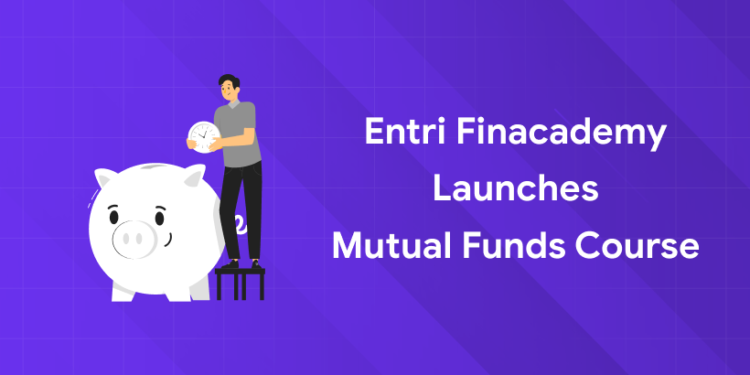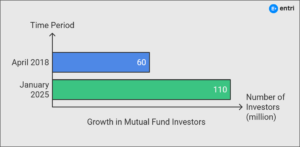Table of Contents
Mutual funds have taken the trading community by storm, especially in India. In such a scenario, Entri, one of the leading course providers, has launched its mutual funds course through Entri Finacademy. Read on to learn more!
Check out this video by Entri in Malayalam!
Introduction: About Entri & Finacademy
Founded in 2015, Entri is a vernacular language learning platform focused on providing relevant job skills. For the past decade, Entri has been dedicated to ensuring that anyone with a strong will to study should have access to relevant and quality education. With this thought in mind, a large number of courses have been deployed. But what makes Entri stand out is that these courses are available in regional languages, including Malayalam, Telugu, Kannada, Hindi, and Tamil.
You’ll be surprised to know that there are housewives who have availed themselves of the course and are now placed at various companies. Along with them, many youngsters have availed themselves of the courses and have achieved job roles in various companies. This shows the level of dedication Entri has towards carving a society with relevant and beneficial skills. India faces a lot of unemployment, especially among the youth. With the help of a dedicated placement team as well as their recently launched Entri jobs, they plan to revolutionise the job sector.
The courses provided are beginner-friendly and handled by industry experts who have years of experience to guide you to your financial freedom. Entri’s subsidiary wing, Entri Finacadamy, provides the courses related to finance. Live classes as well as recorded classes have been a major part in educating the learners on how to make use of their capital. For two years, Entri Finacademy has been providing knowledge to society with its beginner-friendly courses. Along with SEBI compliance, Entri is one of the leading edtech companies out there.
Also read: Entri Finacademy is Now SEBI Compliant!
Introducing Mutual Funds Course by Entri Finacademy
1: What is a stock?
Mutual funds have been the talk of the town recently, especially due to their extravagant ads that keep showing up on TV and other media. The boom that we see in it is due to the potential it holds when compared to other sorts of investments. Nearly every household has an investment in mutual funds with a value of ₹64.53 trillion as of February 28,2025, marking a more than five-fold increase from ₹12.02 trillion on February 28, 2015.
What exactly is a mutual fund?
For those of you, who don’t know, a mutual fund is a pool of money from many investors that is managed by a professional fund manager. The money is invested in a variety of stocks, bonds, or other securities, allowing investors to diversify their investments without having to buy each individual asset themselves. When you invest in a mutual fund, you own a small share of all the assets in the fund.
Also read: Performance Evaluation of Mutual Funds
Imagine there is a big pot, and a bunch of people come together to pool their money into the pot. This money is taken by a professional manager who invests it in things like stocks, bonds, or other assets. In this way, with everyone’s money being in the picture, the risk would be spread out when compared to a person investing on his own. When the investments do well, everyone gets a piece of the profit based on how much money they had put in.
This is what makes up the core idea of a mutual fund. Of course, this is the simplified version and contains the soul of the whole process. Mutual funds can be a bit complex as they are completely subjected to market risks as well. An understanding of the ins and outs of the phenomenon is crucial before investing.
How does it work?
As stated above, a bunch of people come together to pool in some money, which is then managed by a professional manager. When a person buys shares from this fund, they gain a small part of the fund. The value of your share goes up or down based on the performance of the investments. Additionally, you would have to pay a small fee to the manager, and you can earn money through dividends or when the fund sells investments for profit.
While a mutual fund manager decides on how to divide the money across sectors, industries, companies, etc., many funds are known as index or passive funds. This is solely based on the funds’ strategy taken up by the manager. Fortunately, these portfolios or strategies do not need a lot of research, as they simply mirror indexes like the S&P 500.
Also read: Mutual funds vs Fixed Deposits: Which is better?
Are there any benefits?
Mutual funds contain many benefits, and most of these benefits depend on the type of mutual funds as well. Here are some of the common and well-known benefits:
-
Diversification
Mutual funds help you to spread your money across a variety of assets like stocks, bonds, or other securities. This method reduces risk drastically, as you don’t have to depend on just one investment.
-
Professional Managers
One major benefit is the professional and experienced fund managers who will be managing your funds, researching as to which assets should be traded. This is really helpful for people who do not have the time and expertise to invest.
-
Liquidity
Your mutual fund shares can be bought and sold easily, making them a liquid investment. You can access your money whenever you need it, typically at the end of the trading day.
-
Affordability
Mutual funds allow you to enter the market with a small amount. This helps individuals to get exposed to the harvests of the market without any large amounts of money.
-
Automatic Reinvestment
Many types of mutual funds have an inherent feature wherein dividends or interests are reinvested automatically, thus making sure that the maximum profit is attained.
These benefits make mutual funds easy, economical, and accessible, thus making them compatible for freshers and those who want a hands-off approach.
Check your SIP returns with Entri’s SIP Calculator!
Mutual Funds by Entri Finacademy
Entri Finacadmey has launched its own Mutual Funds course with a ton of features and facilities for you to explore and avail. THe course offers you:
- Recorded video classes
- Assignments and quizzes
- PDF notes
- Live interaction session
- Doubt clearance session
When it comes to the attractive features offered, Entri Finacademy is unrivalled:
- Exclusive live sessions: Sessions that are exclusive to the members only.
- Self-paced learning: Our courses offer you the freedom to learn at your own pace, making sure that you get access to our materials anytime you want to.
- Variety of materials: Our materials are meant to engage the learner with a variety of content, including videos, PDFs, quizzes, assignments, etc.
- Community Support: Do not worry about doubts! You can always clarify with our community of experts and peers.
- Focused topics: The materials focus on particular topics and niches so that you get the most out of it.
- Flexibility: We offer courses that are optimized for web and mobile. Wear your learning caps whenever and wherever you are.
- Language inclusion: Our courses are available in multiple languages ensuring that the content reaches to everyone without any barriers.
Mr. Aswin PS is the professional guide that will be guiding you in this course. With his expertise in the field and certified validation, he is the right person for you to enhance your investment gains and earnings.
ASWIN P S
Certified Mutual Fund Distributor
ARN: 26783
Finance educator/content creator with over 130k+ followers. Long term investor in the stock market mutual funds.
Now or Never…..
Mutual funds have been getting a lot of traction over the months, and our experts say that the prominence of it is only going to boom in the coming years. The thought of being financially independent is the driving force in taking up a course and investing wisely. Due to the amount of returns that can be harvested over the years, one can even think about retiring early. So, why not try it? Remember, the early bird catches the worm!
If you are interested in mutual funds and want to try your hand at the same, we suggest you check out Entri Finacademy’s mutual funds course. If you feel like you are not cut out for mutual funds, we advise you to check out other courses offered by them, namely the forex trading course and the stock market course. It is now or never, and it is never too late to begin. Enrol now and start your journey towards financial freedom!
Stock Market Training Reviewed & Monitored by SEBI Registered RA
Trusted, concepts to help you grow with confidence. Enroll now and learn to start investing the right way.
Know moreFrequently Asked Questions
What is a mutual fund?
A mutual fund is a type of investment vehicle that pools money from many investors to invest in a diversified portfolio of stocks, bonds, or other securities. A professional fund manager handles the investments and decisions.
How do mutual funds work?
When you invest in a mutual fund, your money is combined with that of other investors and managed by a professional manager. The fund invests in a range of securities. As the value of these investments rises or falls, the price of your mutual fund shares will also change.
What is the expense ratio?
The expense ratio is the annual fee that mutual funds charge to cover operating costs, including management fees, administrative fees, and other costs. It is expressed as a percentage of the fund’s assets.
How do I make money with mutual funds?
You can make money from mutual funds in two ways:
- Dividends: If the fund holds dividend-paying stocks or bonds, you may receive periodic payments.
- Capital Gains: If the value of the fund’s investments increases, the fund’s share price (NAV) rises, allowing you to sell your shares at a profit.
Are mutual funds safe?
Mutual funds are not risk-free. While they provide diversification, the value of your investment can still go up or down based on market conditions. The risk level varies depending on the type of mutual fund you invest in.
How are mutual funds taxed?
Mutual funds are taxed based on the type of income they generate:
- Dividends: May be taxed as ordinary income or qualified dividends, depending on the type.
- Capital Gains: If the fund sells investments for a profit, those gains may be passed on to you and taxed.
- It’s important to check how your specific fund handles distributions and taxes.
How do I choose the right mutual fund?
Choosing a mutual fund depends on your financial goals, risk tolerance, and investment timeline. Consider the fund’s type (e.g., equity, bond, index), performance history, fees, and how it fits into your overall portfolio. It’s often a good idea to consult a financial advisor for personalized advice.















